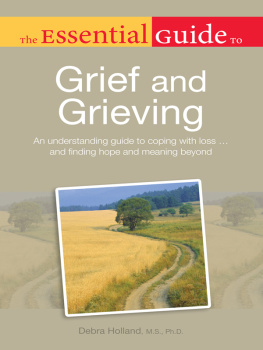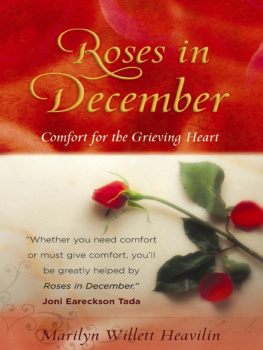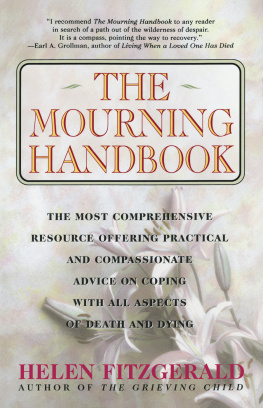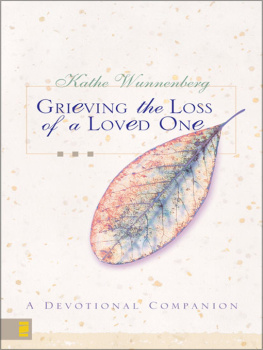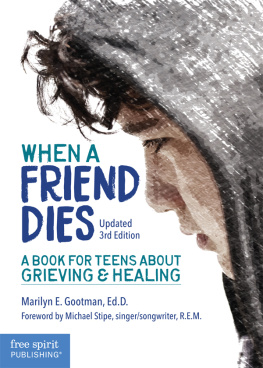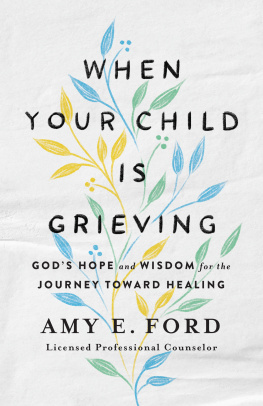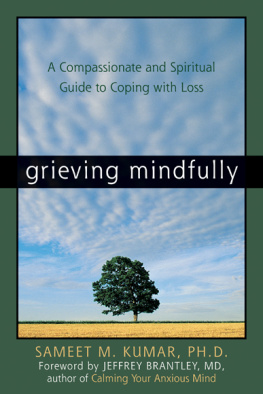Front Matter
Title Page
A HELP IN GRIEF
COPING WITH THE DEATH OF SOMEONE CLOSE
By
Julian Evens, Ben Evens
Philip West
and
Clive Anderson
With a Forword by Debbie Thrower
PATULA BOOKS
Publisher Information
Published by: Patula Books, P.O. Box 6674, Basingstoke, Hampshire RG24 4DP United Kingdom Tel/Fax 01256 381124
www.patulabooks.co.uk
Digital edition converted and
Distributed in 2011 by
Andrews UK Limited
www.andrewsuk.co m
Copyright Julian Evans, Benjamin Evans, Philip West & Clive Anderson 2010
This book is copyright and all enquiries should be addressed to the authors c/o Patula Books.
The rights of the authors to be identified as the authors of this work have been asserted in accordance with Copyright, Designs and Patents Act 1988.
All rights reserved. No part may be reproduced, stored in a retrieval system or transmitted, in any form or by any means, electronic, mechanical, photocopying, recording or otherwise without the prior written consent of the author and publisher. This book is sold subject to the condition that it
shall not by way of trade or otherwise be lent, re-sold, hired out or otherwise circulated without the publishers prior consent in any form of binding or cover other than that in which it is published.
Disclaimer: While every effort has been made to ensure that in this book the facts are accurate and the advice sound, no responsibility can be accepted by the authors or publisher for the consequences of acting on them or failure by the reader to comply fully with all current legislation. This book is only an introductory guide.
Dedication
To those weve loved and lost
Foreword
None of us grieves in quite the same way, because we are each unique. Yet there are some common characteristics in grief. I commend this book for the clear way it covers the practical and emotional aspects of bereavement. The writers bring varied professional expertise coupled with first-hand experience of losing a loved one. Each offers a different, always sensitive, perspective on what - despite the sorrow - can be a deeply moving and enriching time.
Part of my role as a Simeon Chaplain to Older People is to help the bereaved, or those facing death, reflect on loss and discern meaning and purpose in lifes journey. It can make all the difference if we are shown how to reflect fully on our experiences, both good and bad. A Help in Grief suggests ways we might remember the person we have lost and come to be profoundly grateful for all they have meant to us. For some its greatest value will be in navigating a way through the often bewildering practicalities. Useful too is a summary of what different faiths believe about life after death.
A book to keep to hand in a crisis, it would also make a timely gift from a compassionate friend. What we all need most when we are hurting badly is for someone to look as if they are trying to understand us. Help is at hand within these pages whether grief is acute, or you are someone who just wants to find the right things to say... Dip into its distilled wisdom and, I hope, youll find consolation.
Debbie Thrower, Broadcaster and Simeon Chaplain to Older People
Preface
All four of us as authors have contributed to writing A Help in Grief in the hope it will be helpful and useful. As four men, we recognised that it was important to have a female perspective on the subject. We are therefore especially grateful to several women who were among those who kindly reviewed the text, and have been pleased to incorporate changes that arose from their comments and suggestions.
We are also aware that this book might easily have been divided into two - the personal and the practical. We reflected on this and decided to continue with the decision to keep everything together in one volume. After all, the book is a resource to refer to, not a novel or narrative to read from cover to cover. Likewise, each of us writes in a particular style and in the final editing we decided to retain this variety and this more personal approach.
The contrasting styles reflect in part the differing nature of the topics each of us has written about. For example, in the first part of the book we more usually refer to the one who has passed away as your loved one and in the second part, with its treatment of practical, official and legal matters, with the more dispassionate the deceased. We recognise, too, that not everyone who is close was loved and appreciated. Some of the closest family relationships are fraught or have a long history of hurt, and reference to loved one seems as inappropriate in such cases as the deceased seems cold and uncaring in others when the person who has passed away was so dear, so precious and so loved.
We are acutely aware of the very sensitive nature of our subject. And very personal, too, are the anecdotes, all of which are true. We know we havent covered everything or always offered all shades of opinion, but we hope there is sufficient here genuinely to be A Help in Grief.
Julian Evans, Ben Evans, Phil West & Clive Anderson
May 2010
Acknowledgements
As well as the authors reading each others material we have benefited from the advice and suggestions of several reviewers with expertise in: undertaking/funeral directing, training and development, the hospice movement, the law, counselling and trauma. We are very grateful to family members, particularly our wives Margaret (Julians late wife was also Margaret), Anna, Ruth and Amanda, and friends many of whom have known the grief of loss and yet who have been willing to share with us their experiences. We take, of course, responsibility for any errors or inaccuracies that have crept in.
We are grateful to John White and Stephen Evans for the pen-and-ink sketches.
We are grateful, too, to Debbie Thompson (nee Thrower) for the encouragement of her Foreword.
We would like to record our very special thanks to and specifically acknowledge the following: Kevin Croft, Delcie Dalby, Christina Evans, Geoff Fisher, Sue Mills, Gill Steel, Rod and Sue Stewart, and Paul and Sue Susans.
Permissions have been given by the following:
In Chapter 11 and in the Appendix we reproduce some Crown copyright material (text only) from the governments website www.direct.gov.uk .
A Help in Grief
A Great Shock
By Julian Evans
If, as you open this book, you ache with grief: our very deepest sympathy.
Eight years ago my wife of 32 years died very suddenly; even an hour before her death neither of us realised how ill she was. Ben, my son, who has written several of the early chapters, heard the terrible news later that night. His mother had died and he didnt even know she had been taken ill and so no opportunity for final words, expressions of love, or a last visit. Phil, the author of Chapters 2 and 7, lost his mother from cancer at the age of 63, and, Clive, who has written Chapter 4, suffered the tragedy of his brother drowning when just 18 years of age.
The pain of loss, the yawning gap in ones life, the unsought and unwanted wrenching away is unbearable. It hurts and hurts and no book can make up for the heartache of bereavement. But we hope we can help you along the path all of us are, at some time or other, likely to tread. In particular we want to remove some of the obstacles, explain some of the things that puzzle, and outline what usually happens and what needs to be done in the days, weeks and months following bereavement. We want to come alongside and share our experience at a time you are confronted with decisions and actions often wholly unexpected and unsought. We hope we may be of assistance as you travel your own path through grief.
The Shock of Loss
Whether sudden or long expected, the death of someone close comes as a shock. And shock affects us in all sorts of ways. Rachel, a close friend, knew for months that her husbands melanomas were life threatening. She felt prepared, and nursed him in the final days. But she said: In the first few days after Peter died, I simply couldnt get warm. I felt chilly and cold all the time. Even now (speaking 10 days later) I cant settle, and flit from one thing to another. This is all very natural and very normal.
Next page



